VE Day: 'Do not despair, do not yield'
- Published
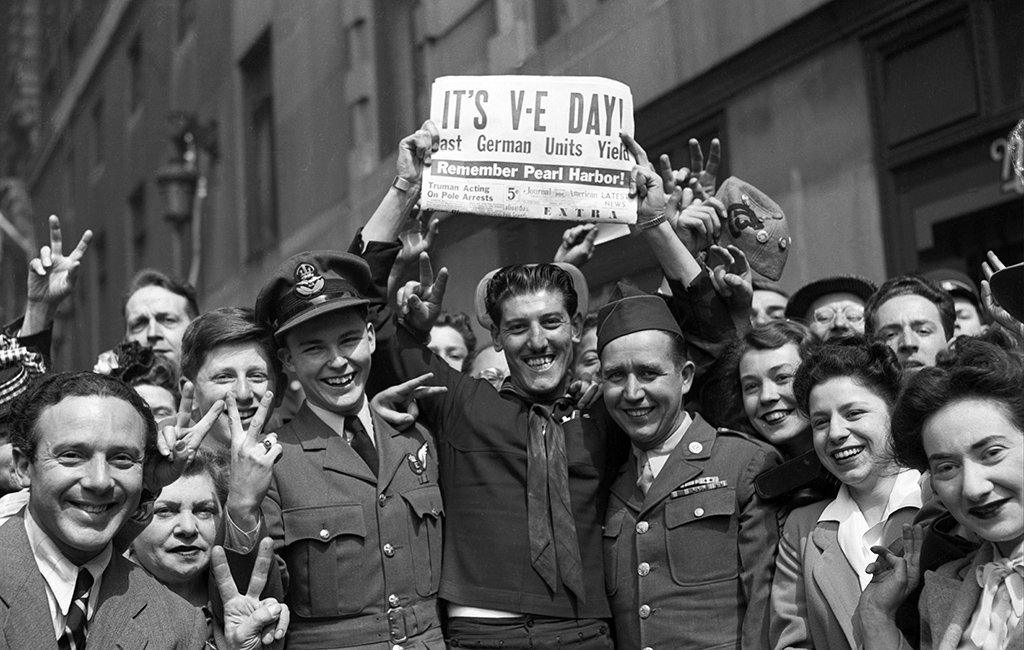
VE Day is an event clouded in mythology. Allan Little looks at what really happened that day, in Britain and throughout Europe, using the BBC archive.
On the afternoon of 8 May 1945, BBC war correspondent Wynford Vaughan-Thomas stood in the town square of the medieval city of Luneburg in north-western Germany. RAF aircraft flew. A white sheet of surrender hung from one of the windows of the old town hall.
"The leading citizens of Luneburg are standing waiting," Vaughan-Thomas reported, "and behind them are Bren gun carriers and lorries passing in a steady stream.
"And there's an endless line of German soldiers, the disbanded wreckage of the German army. But no-one even bothers to notice them any more. They tramp by to the nearest prison camp and even the citizens of Luneburg don't lift their heads to notice them.
"The war for them is over," said Vaughan-Thomas.
A British army spokesman addressed the crowd.
"People of Luneburg, the Nazi government and the German Wehrmacht have surrendered unconditionally to the Allied Expeditionary Forces," he said, and his voice, amplified by a PA system, carried across the square and into Vaughan-Thomas's microphone and, through radio, into homes across the United Kingdom and much of the British Empire.
"This unconditional surrender was signed on behalf of the German High Command by Field Marshall Jodl.
"Europe has been brought to famine and misery by the Germans. The German nation must not expect to fare better than the nations they have overrun."
Frank Gillard reports from Kassel in Germany on VE Day, 8 May 1945
In the nearby city of Kassel, Vaughan-Thomas's colleague Frank Gillard stood in the wreckage. Much of the city had been reduced to rubble in a battle a month earlier.
Gillard was witnessing the start of what would soon become the greatest population upheaval in European history - the migration of millions of people displaced by the war.
"Most of those who are on the streets today are displaced persons, Belgians and French people going westwards, Russians and Poles going east.
"And here, right before me now, comes a handcart, loaded up with a big wooden box, a couple of suitcases, and one or two sacks stuffed with I suppose clothing of some sort, and it's being pulled by two sturdy-looking women who are tramping out - I suppose they're French or Belgians, they are tramping out in a westerly direction through Kassel. And just behind them there comes an old man pushing a bicycle, also loaded up with all the kit you could imagine, about as much as a bicycle could possibly hold, he's going home as well, perhaps to France or to Belgium…
"The war in Europe is over and here in Kassel, as in many German cities, there's nothing but the grey ruins to mark its passing."
Those two eyewitness dispatches survive in a remarkably vivid BBC radio archive. What was then the BBC Home Service was on the air throughout the day, carrying live and recorded reports of scenes of desolation from across Europe - and of jubilation on the streets of Britain.

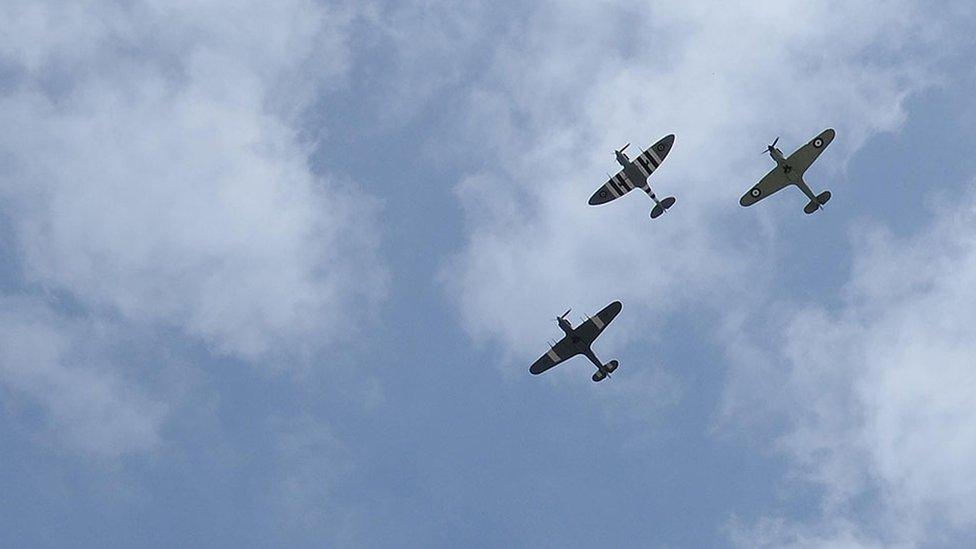
A flypast in London, in 2015, for the 70th anniversary celebrations of VE Day
VE Day at 75: Find out more
Explore radio news reports from the BBC Archive on VE Day, 1945
BBC One will commemorate the 75th anniversary of VE Day on 8 May with a series of programmes

It had begun the previous day. A typewritten script of the 18:00 radio news bulletin survives, with the newsreader's handwritten amendments and crossings-out.
"No statement has been made about the prime minister's VE Day broadcast," the script reads.
"But unconfirmed reports from correspondents say that the unconditional surrender of Germany to the Western Allies and Russia was signed in the early hours of this morning. They say the ceremony took place in the schoolhouse at Rheims which General Eisenhower uses for his headquarters."
What the correspondents did not yet reveal was that the Germans had petitioned the Western Allies for a separate peace in the west, leaving German forces free to carry on the war against the Soviet Union in the east. The Allied commander, General Eisenhower flatly refused; on 6 May, he had told the Germans that unless they surrendered unconditionally on all fronts, that Allied air raids would resume.
For Germany, General Alfred Jodl signed the surrender document at 02:41.
The war in Europe was over.
On the morning on 8 May, the BBC's 08:00 news bulletin began with the words: "Here is the eight o'clock news for today, Tuesday May the 8th; the Day of Victory in Europe."
The same bulletin reported that the Eastern German city of Breslau had fallen to the Soviet Red Army after 12 weeks of heavy fighting, that King Leopold of the Belgians and his wife, held as prisoners in Austria, had been freed by American troops, and that, in the war against Japan, American, Australian and Dutch forces had made further gains.
All morning the BBC brought news from across Europe, often from places that had been liberated only hours earlier.
The correspondent in Amsterdam, Robert Dunnett, reported seeing collaborators being rounded up and paraded through the streets where the crowds booed them.
"Whenever they [Dutch citizens] see an Allied soldier, they cheer and lift him right up into the air," he reported, and recorded a crowd singing, It's a Long Way to Tipperary.
"I was," he added, "carried myself about 50 yards by a strong and healthy young Dutchman!"
Denis Johnston arrived at Hitler's Bavarian retreat at Berchtesgaden. In his dispatch, he seems subdued. He had been reporting on the war for three years and is audibly struggling to grasp that it is, in Europe at least, over at last.
"It's rather hard to know what to say," he says.
"There have been so many false dawns. We are quite unprepared.
"Hitler's villa has been done over by the SS. They didn't want it taken by us so they've burned it out. Here around me the trees are shattered by bombs... This scarred and blackened villa behind me with its empty flagpole seems to be a very elegant comment on the whole situation."
In an evocative dispatch from a country road outside Emsdorp in Austria, the British public heard the voices of German soldiers, exhausted and humiliated, being questioned by US servicemen. BBC correspondent Robert Reid watched tens of thousands of defeated men, many of them "stretched out dead beat" on the bonnets of their vehicles, being sent into a field that was being used as a "temporary cage".
Maj James L Sumter, of Pittsburgh, Pennsylvania, told Reid the men were "mostly stragglers" - including the 12th SS Hitler Youth Division - trying to flee from advancing Soviet forces further east.
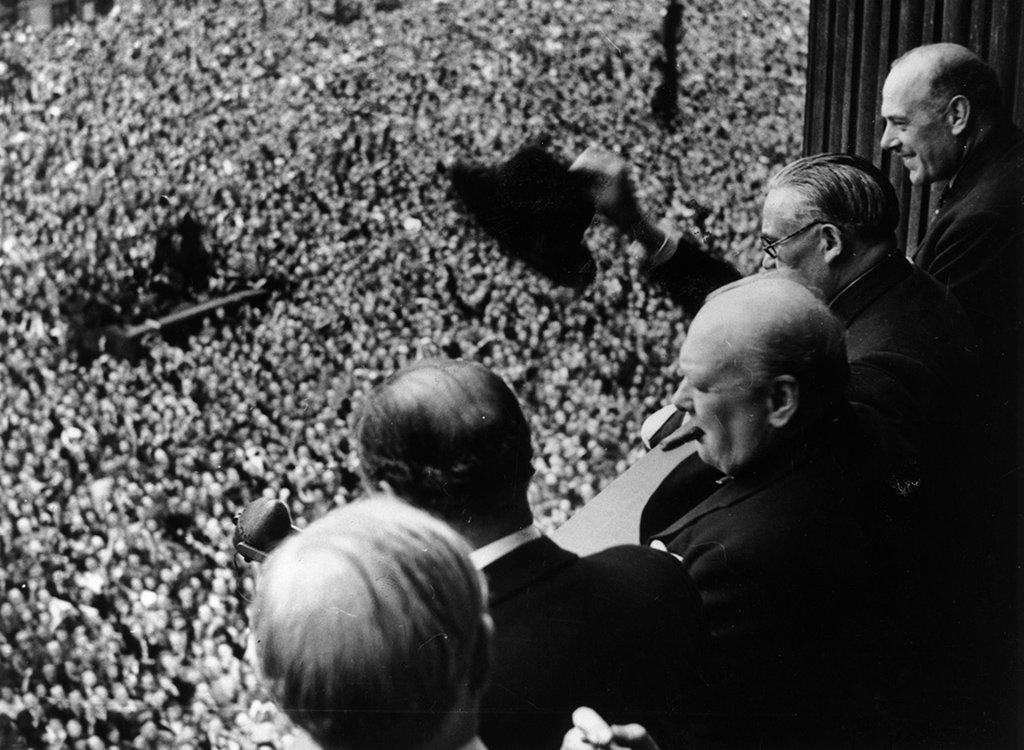
Prime Minister Winston Churchill addresses a huge crowd in Whitehall on VE Day, 8 May 1945
"We've had no trouble with any of them," the Major says. "They have no guilt in their feeling at all. They just seem to be happy to get away from the Russians."
In London, crowds had been gathering since early morning. At noon, the bells of St Paul's Cathedral - itself a symbol of defiance having survived the Blitz as buildings all around it had been engulfed in flames - rang out across the capital.
At 15:00, Winston Churchill addressed the nation from 10 Downing Street. He recalled the dark early days of the war.
"After gallant France had been struck down [in May 1940]", he said, "we from this island and from our united Empire maintained the struggle single-handed for a whole year until we were joined by the military might of Soviet Russia and, later, by the overwhelming power and resources of the United States of America.
"Our gratitude to all our splendid allies goes forth from all our hearts in this island and throughout the British Empire.
"We may allow ourselves a brief period of rejoicing."
And rejoice they did. Crowds gathered outside Buckingham Palace where they listened in silence as Churchill's speech was relayed on loudspeakers.
BBC correspondent Howard Marshall reports from outside Buckingham Palace on VE Day, 1945
BBC reporter Howard Marshall was among the crowds. "The entire space, the whole scene is one dense mass of people in the gayest colours: red, white and blue rosettes, red, white and blue hats, streamers, flags. The Queen Victoria Memorial is covered with people - a land girl sitting on the bronze lions, a Wren sitting up behind her, flags everywhere."
He saw a South African flag carried to the front of the crowd, and soldiers and airmen from Canada, New Zealand and the United States join festivities. There were visible reminders of the years of conflict that had just ended: the broken columns where a German bomb had struck Buckingham Palace during the Blitz.
"Still," he added, "the feeling is one of thanksgiving rather than of celebration, a quiet and deep joyousness."
Joy Hunter worked as a typist at 10 Downing Street and in the underground bunker beneath Whitehall known as the Cabinet War Rooms. She was among the crowd at Buckingham Palace.
"We were right by the gates. Churchill came out. There was tremendous cheering and shouting and noise. Then we went back down the Mall to Trafalgar Square and there we saw them all dancing, doing the conger eel, going round everything. It was just hysteria really. Probably people didn't know quite how to behave. It had been so tight - and now it was over."
Did the public understand, on that day, how profoundly Britain and the wider world had been changed by the war; that there would be no going back to the old normal of the 1930s?
This had been total war: the state had assumed sweeping new powers to mobilise the whole country for the war effort. Many of those powers would now survive into peacetime.
The government took much of the economy into state ownership: the railways, the coal mines, iron and steel.
A new welfare state and a National Health Service would bring state provision into every home in the country.
For war had created a new public mood that would change the relationship between the state and society for a generation.
"To a remarkable degree, this includes people who think they'll be worse off under this new settlement," says historian Dan Todman, author of Britain's War: A New World, 1942-47.
"Quite a large proportion of middle-class people who weren't going to benefit necessarily from it said that they still thought it was a good idea; that it was something that ought to be done for other people.
"So I think that's part of that wartime mood: the recognition that the nation-state owes something to everybody, especially the least fortunate members of society."
Churchill's reference to the "overwhelming power and resources of the United States of America" pointed the way to the new world that would open up from now on - leadership of the Western world had crossed the Atlantic. The United States did not, as it had done in 1918, retreat to its tradition of isolation.
Britain had not stood entirely alone in 1940: it had had its Empire. How many of those rejoicing on the streets of London could have foreseen that that Empire would soon cease to exist? Britain was no longer the pre-eminent global power. By 1960, the USA would account for nearly half the wealth of the entire globe. The post-war world would be shaped by that new American-led reality.
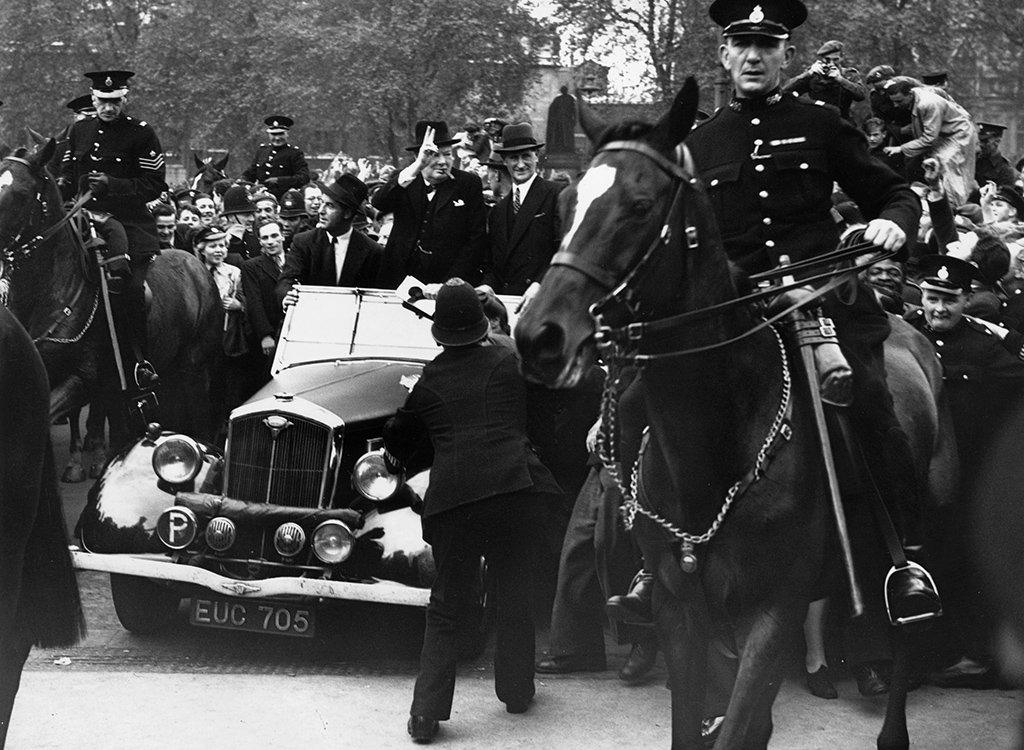
Churchill rides in an open car to the House of Commons, surrounded by celebrating crowds on VE Day, 1945
On the streets of London, Churchill's speech was the signal for the revelry to begin in earnest.
At 15:20, broadcaster Richard Dimbleby was among the crowd in Whitehall when something unexpected happened.
"It's been an amazing moment," he said, "and one that we didn't know was going to happen."
Churchill had emerged from Downing Street standing upright in an open-topped car, holding on to the windscreen and, according to Dimbleby, trying to make his way to the House of Commons where he was due to address Parliament.
"But with the crowd so tightly packed, so enormous and so enthusiastic, he could not get through," said Dimbleby.
"As he moved, the crowd grew tighter and tighter and the cheering louder... It looked as though they might lift the whole vehicle off the ground in their enthusiasm."
In his 15:00 broadcast Churchill had concluded by reminding the country that Imperial Japan was still undefeated and that Allied forces were still fighting in the East. That warning was echoed in one of the most poignant and arresting moments of the entire day's broadcasting.
Mrs MacDonald - who lost a son in the war - reacts to VE Day on 8 May 1945
A correspondent in Edinburgh had described the scenes there, with citizens dancing eightsome reels in the shadow of Edinburgh Castle. Then he crossed to Glasgow, and to a voice he introduced only as Mrs MacDonald. Seventy-five years on, the voice is striking for its quiet, anguished dignity, which stands in stark contrast to the unrestrained joy of the street parties.
Her youngest son was only seven, she said, but she had four other boys who'd all enlisted.
"And it's one of them, Roy, that I'm thinking of especially. He was in his second year, learning to be a doctor, at the Glasgow University in 1939. He volunteered for the Black Watch and then got a commission in the HLI [Highland Light Infantry].
"Roy was killed in Italy.
"Another of my sons had been discharged from the Scots Guards with the loss of one of his legs.
"I can't forget that the war is only half done. I have another son in the Air Force in South East Asia Command. And my second youngest has just got into the Fleet Air Arm.
"On this day of victory I pray that soon the war in the East will be over too, so that, with your sons, they will return home before long.
"Until then, God keep them, wherever they may be."
Churchill had also used his broadcast to remind the country that the only part of Britain that had been occupied by Nazi Germany was what he called "our dear Channel Islands". Seventy thousand British people had lived under occupation there since 1940 and although France had been liberated in 1944, the Channel Islands had remained under German occupation until VE Day.
The BBC now crossed to those islands and introduced a voice identified on air only as "a woman of the Channel Islands".
"This last year has been the most terrible of all," she said. "We hoped that D-Day [6 June, 1944] would bring some relief. But since then there has been a terrible winter with no light or heat or food.
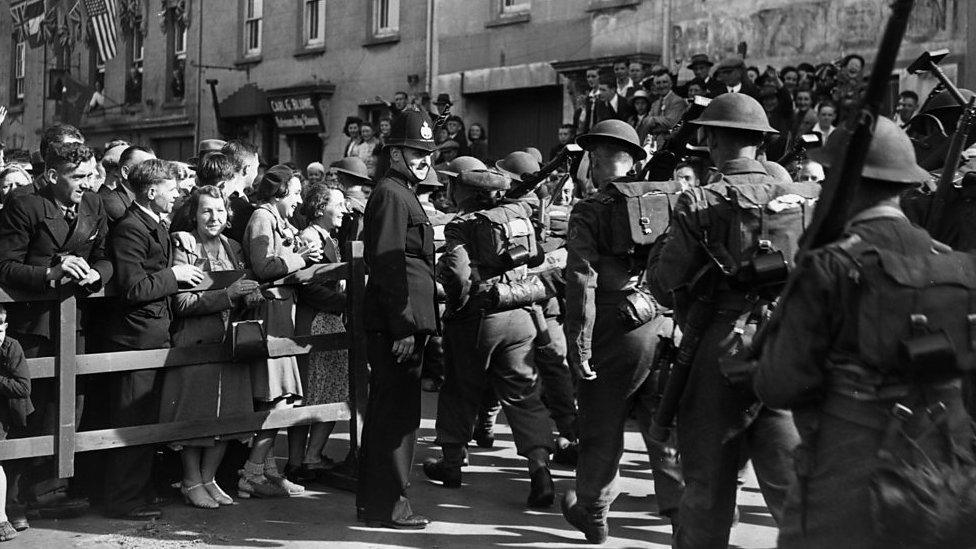
British troops in Jersey on 13 May 1945, soon after the occupation of the Channel Islands came to an end
"My own anxiety was relieved only a week ago when I had a short message from my family to say that they were alive and well. But thousands of us haven't even had that.
"So this is the first day of real hope - for us a day not of rejoicing but of deep relief and thankfulness that after all our sufferings we are free, and under our own flag again."
By late afternoon, news was coming in from the United States, where President Harry S Truman had made a broadcast at the same time as Churchill's in London.
A correspondent in New York reported that Times Square was now a "milling crowd of delirious people... and from the windows of the skyscrapers high above us great showers of paper and coloured streamers are floating down - an absolute blizzard of paper".
In Cincinnati, the crowds gathered and some began to fire their weapons into the air. An effigy of Hitler was suspended from a lamp post. And in San Francisco, a young reporter called Alistair Cooke - who would go on to enthral listeners with his longstanding weekly Letter From America - described a much more subdued atmosphere.
"San Francisco is certainly relieved that it doesn't have to go on looking over its shoulder at the deaths of its boys in Europe. But it faces west, as the thousands of sailors here well know. Last night, two Marines threatened to bust the nose of a man who said, 'Well, so the war's over'.
"The docks are being got ready not for any celebration but for the few million men fresh from Europe who will pass through here to the still unfinished Battle of the Pacific."
But by evening, in London, the rejoicing was unrestrained. The listening public heard a raucous rendition of Knees Up Mother Brown in an East End pub.
In an unscheduled appearance, Winston Churchill appeared again on the balcony of the Ministry of Health in Whitehall, dressed in a boiler suit.
The speech was not broadcast but Richard Dimbleby was in the crowd and reported what he saw and heard.
"We were the first, in this ancient island, to draw the sword against tyranny. And after a while we were left alone," Churchill said.
"There we stood, alone. Did anyone want to give in?"
"No!" the crowd roared back.
"Were we downhearted?"
"No!" they answered.
Churchill would later say that history would be kind to him because he intended to write it. He began at that moment, on the balcony of the Ministry of Health, to articulate a sense of what Britain had done and what it had stood for in the war years that the country still acknowledges and celebrates 75 years on.
"We came back after long months from the jaws of death, out of the mouth of hell, when all the world wondered - when shall the reputation and faith of this generation of English men and women fail?
"I say that in the long years to come, not only will the people of this island but of the world, wherever the bird of freedom chirps in human hearts, look back to what we've done and they will say, 'Do not despair, do not yield to violence and tyranny, march straightforward and die if need be, unconquered'."
All images subject to copyright